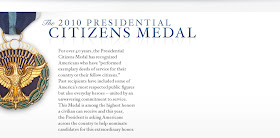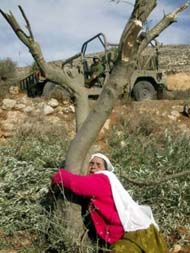
Speaking at Vermont Avenue Baptist Church in Washington, DC, the President honors Martin Luther King's legacy and ideals, and discusses his thoughts on how the lessons of that time apply to the tough times of today.
Martin Luther King and the Challenges of a New Age
Posted by Jesse Lee on January 17, 2010 at 04:20 PM EST
Let it be clear up front that it is well worth considering the President's remarks today in full - by all means simply watch them in their entirety above or read the full transcript.
As he began his remarks today focused on honoring the legacy and ideals of Dr. Martin Luther King, President Obama spoke first about the venue in which he spoke:
Now, it's fitting that we do so here, within the four walls of Vermont Avenue Baptist Church -- here, in a church that rose like the phoenix from the ashes of the civil war; here in a church formed by freed slaves, whose founding pastor had worn the union blue; here in a church from whose pews congregants set out for marches and from whom choir anthems of freedom were heard; from whose sanctuary King himself would sermonize from time to time.
The President spoke of the time and problems that Dr. King referred to as the "Challenge of a New Age" - a time when pivotal victories of the Civil Rights struggle had been won in the courts, but when racism still persisted, and when these rulings were still defied in the South:
So it's not hard for us, then, to imagine that moment. We can imagine folks coming to this church, happy about the boycott being over. We can also imagine them, though, coming here concerned about their future, sometimes second-guessing strategy, maybe fighting off some creeping doubts, perhaps despairing about whether the movement in which they had placed so many of their hopes -- a movement in which they believed so deeply -- could actually deliver on its promise.
So here we are, more than half a century later, once again facing the challenges of a new age. Here we are, once more marching toward an unknown future, what I call the Joshua generation to their Moses generation -- the great inheritors of progress paid for with sweat and blood, and sometimes life itself.
The President went on to discuss the lessons of hope and fortitude that this "Joshua generation" could learn from that "Moses generation":
First and foremost, they did so by remaining firm in their resolve. Despite being threatened by sniper fire or planted bombs, by shoving and punching and spitting and angry stares, they adhered to that sweet spirit of resistance, the principles of nonviolence that had accounted for their success.
Second, they understood that as much as our government and our political parties had betrayed them in the past -- as much as our nation itself had betrayed its own ideals -- government, if aligned with the interests of its people, can be -- and must be -- a force for good. So they stayed on the Justice Department. They went into the courts. They pressured Congress, they pressured their President. They didn’t give up on this country. They didn’t give up on government. They didn’t somehow say government was the problem; they said, we're going to change government, we're going to make it better. Imperfect as it was, they continued to believe in the promise of democracy; in America's constant ability to remake itself, to perfect this union.
Third, our predecessors were never so consumed with theoretical debates that they couldn't see progress when it came. Sometimes I get a little frustrated when folks just don't want to see that even if we don't get everything, we're getting something. (Applause.) King understood that the desegregation of the Armed Forces didn’t end the civil rights movement, because black and white soldiers still couldn't sit together at the same lunch counter when they came home. But he still insisted on the rightness of desegregating the Armed Forces. That was a good first step -- even as he called for more. He didn’t suggest that somehow by the signing of the Civil Rights that somehow all discrimination would end. But he also didn’t think that we shouldn’t sign the Civil Rights Act because it hasn’t solved every problem. Let's take a victory, he said, and then keep on marching. Forward steps, large and small, were recognized for what they were -- which was progress.
Fourth, at the core of King's success was an appeal to conscience that touched hearts and opened minds, a commitment to universal ideals -- of freedom, of justice, of equality -- that spoke to all people, not just some people. For King understood that without broad support, any movement for civil rights could not be sustained. That's why he marched with the white auto worker in Detroit. That's why he linked arm with the Mexican farm worker in California, and united people of all colors in the noble quest for freedom.
Of course, King overcame in other ways as well. He remained strategically focused on gaining ground -- his eyes on the prize constantly -- understanding that change would not be easy, understand that change wouldn't come overnight, understanding that there would be setbacks and false starts along the way, but understanding, as he said in 1956, that "we can walk and never get weary, because we know there is a great camp meeting in the promised land of freedom and justice."
Even more broadly, he spoke to two of the defining principles both of the Civil Rights era and the entire history of this nation - hard work, and faith.
On hard work:
Progress will only come if we're willing to promote that ethic of hard work, a sense of responsibility, in our own lives. I'm not talking, by the way, just to the African American community. Sometimes when I say these things people assme, well, he's just talking to black people about working hard. No, no, no, no. I'm talking to the American community. Because somewhere along the way, we, as a nation, began to lose touch with some of our core values. You know what I'm talking about. We became enraptured with the false prophets who prophesized an easy path to success, paved with credit cards and home equity loans and get-rich-quick schemes, and the most important thing was to be a celebrity; it doesn’t matter what you do, as long as you get on TV. That's everybody.
And on faith:
It's faith that gives me peace. The same faith that leads a single mother to work two jobs to put a roof over her head when she has doubts. The same faith that keeps an unemployed father to keep on submitting job applications even after he's been rejected a hundred times. The same faith that says to a teacher even if the first nine children she's teaching she can't reach, that that 10th one she's going to be able to reach. The same faith that breaks the silence of an earthquake's wake with the sound of prayers and hymns sung by a Haitian community. A faith in things not seen, in better days ahead, in Him who holds the future in the hollow of His hand. A faith that lets us mount up on wings like eagles; lets us run and not be weary; lets us walk and not faint.
So let us hold fast to that faith, as Joshua held fast to the faith of his fathers, and together, we shall overcome the challenges of a new age. (Applause.) Together, we shall seize the promise of this moment. Together, we shall make a way through winter, and we're going to welcome the spring. Through God all things are possible. (Applause.)
May the memory of Dr. Martin Luther King continue to inspire us and ennoble our world and all who inhabit it. And may God bless the United States of America. Thank you very much, everybody. God bless you. (Applause.)















































